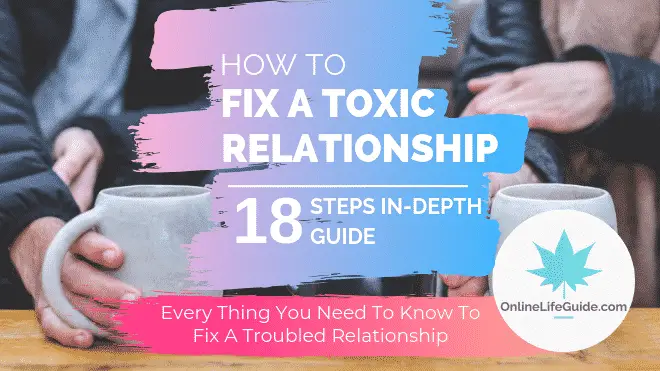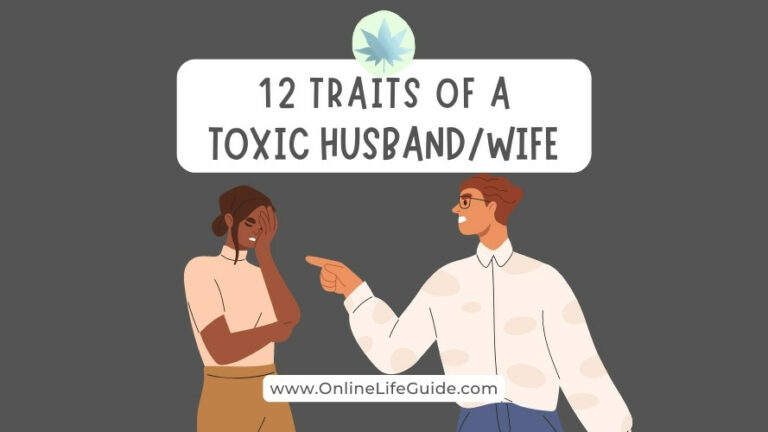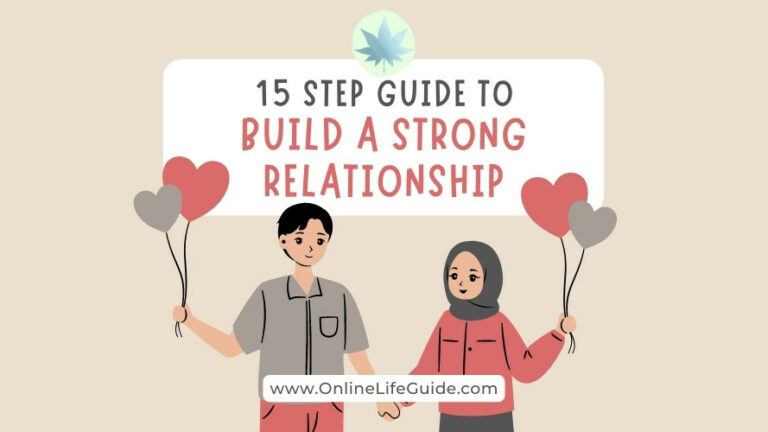10 Clear Signs You’re Actually In a Mature Relationship

This article is part of the Emotional Maturity Series – a series of articles that discusses emotional maturity in depth. In this article, we will look into 10 Signs of.
Love is exciting, it’s exhilarating, and most of the time, it’s utterly confusing especially when it comes to figuring out if you’ve actually stumbled into a mature relationship or are just playing dress-up with adult titles.
Because let’s be honest, society throws the word “mature” around like confetti at a wedding. You get married, you get a mortgage, you ADULT.
True maturity and strength of a relationship are tested during the messy or even the quiet moments in between all the highlights. It’s about how you handle the fights you have, the compromises you make, and the way you stand together in the face of challenges.
The reality is, relationships can be a freaking mess. One minute you’re all sunshine and rainbows, the next you’re reenacting a scene from a bad reality TV show.
It’s enough to make you wonder if happily ever after was just a wishful phrase written on the back of the wedding cars back in the day.
The thing is, healthy, fulfilling relationships do exist. They’re not reserved to fairytales, but are a product of conscious effort and, you guessed it, emotional maturity.
Now, before you roll your eyes and think, “Ugh, another self-help article telling me to be more mature,” hear me out. Maturity in relationships isn’t about being some uptight, emotionless robot.
It’s about ditching the drama, learning to handle the messy parts with grace, and mindfully building a partnership that stands the test of time.
Mature relationships aren’t devoid of challenges or disagreements. But they are fortified by a deep understanding, effective communication, and a conscious effort to nurture the bond.
Their foundation is based on mutual respect, growth, and unwavering commitment to facing life’s storms together.
So, how do you know if you’ve found the real deal? Here are the 10 signs that your relationship is actually built on something more than puppy love and cheesy Instagram filters:
1. You Can Actually Talk to Each Other (and Actually Listen)

Communication. It sounds too simple and cliche, right?
Mature couples express their needs and desires clearly, without resorting to emotional outbursts or passive-aggressive jabs. They listen actively, trying to understand where their partner’s coming from, not just waiting for their turn to speak.
Most importantly, they focus on problem-solving instead of assigning blame. Mature couples know that pointing fingers never fix a leaky faucet, and it sure as hell won’t fix a relationship.
What This Looks Like:
Let’s say you’re feeling burnt out from work and need some help with household chores. Instead of stewing in silence and letting resentment build, you can talk to your partner about it.
You could say something like, “Hey honey, I’m feeling overwhelmed with work lately. Would it be okay if we split the cooking duties this week?”
A mature partner would listen attentively, understand your needs, and be willing to help out without making you feel guilty for asking.
2. You Deeply Respect Each Other

Respect isn’t about grand gestures and buying expensive gifts (although those can be nice too, don’t get me wrong). It’s about the everyday stuff. It’s treating your partner with dignity, even when you disagree.
It’s accepting their flaws and imperfections, and understanding that nobody is perfect (especially you).
It’s valuing their opinions and respecting their boundaries, even when they differ from your own.
What This Looks Like:
Maybe your partner loves spending Sundays curled up with a good book, while you’d rather be out socializing. A mature approach would be to respect their need for quiet time and plan social activities for another day. You could even compromise by spending part of the morning reading together and then heading out for a brunch date in the afternoon creating a win-win situation for both.
3. You Don’t Need to Be Attached at the Hip (Interdependence & Boundaries)

A mature relationship isn’t about clinging to each other and neglecting your individual growth. True mature Love isn’t about suffocating codependency. It’s about maintaining a healthy sense of self and sharing a life where you both thrive.
Mature couples have Healthy Boundaries. Those boundaries define your personal space, needs, and values. Setting healthy boundaries means respecting your own needs and respecting your partner’s. It means saying no when you need to, without feeling guilty, and it means expecting the same from your partner.
Without boundaries, your relationship becomes a tangled mess, where individual identities get blurred and resentment builds. Setting healthy boundaries allows you to maintain your individuality while fostering a strong connection with your partner.
This means that mature couples trust and encourage each other’s growth. They don’t get jealous when their partner spends time with friends or pursues individual hobbies. They know that a strong relationship is built on two whole people, not two halves clinging to each other for survival.
A Mature, healthy relationship is a fertile ground where both of you can flourish. By nurturing your individual growth, you bring new perspectives and experiences back into the relationship, enriching the connection you share.
Mature couples understand that personal growth is essential for a healthy relationship. They understand that individual growth strengthens the relationship as a whole.
What This Looks Like:
You might be really into rock climbing with your buddies, while your partner prefers yoga with her friends. In a mature relationship, you’d support each other’s passions and give each other some space to have some “me-time” and reconnect with your own inner selves. and. So you could plan a couple of your weekends every month so you both have time for your hobbies individually and then catch up at a dinner date afterward to share your experiences.
4. You Feel Your Feelings (and You Don’t Freak Out About Your Partner’s)

Emotional intelligence is a superpower in relationships. It means understanding your own emotions and how they affect you. It means being able to empathize with your partner’s feelings, even when they’re different from your own. It means managing your emotional responses in a healthy way and avoiding knee-jerk reactions and meltdowns.
We all have emotions, and that’s perfectly okay. But in mature relationships, we don’t let our emotions control us. We take responsibility for our reactions, instead of blaming our partner for making us feel a certain way. We learn to manage our emotions healthily, whether it’s through exercise, journaling, or simply taking a deep breath before reacting.
Let’s be honest, blaming your partner for your insecurities or getting jealous over every like they get on social media isn’t exactly the recipe for a mature relationship. It’s about owning your emotions, understanding their triggers, and developing healthy coping mechanisms to deal with them constructively.
Both partners possess a healthy understanding of their own emotions and can identify their triggers. They practice self-regulation, expressing their feelings constructively and avoiding emotional manipulation. They also possess strong empathy, actively trying to understand their partner’s emotional state and responding with compassion.
Basically, the crux is that you don’t turn into a toddler throwing a tantrum every time things don’t go your way.
What This Looks Like:
Let’s say there is something in your relationship that made you feel disappointed or upset. A mature approach would be to acknowledge your feelings and talk to your partner about them.
You could say, “Hey, I’m feeling down about the recent issues we’ve been having. Can we talk about it?”
Your partner, being emotionally intelligent, would listen without judgment and offer support. They might validate your feelings by saying, “I understand. I get what you’re saying”. Then once those emotions are acknowledged and settled, you both can discuss possible resolutions.
5. You Share the Damn Chores (and the Credit Card Bill)

Let’s be real, chores and finances are the battlegrounds of many a relationship. Mature couples understand that these are shared responsibilities. They create a system that works for both of them, whether it’s splitting chores and expenses down the middle, tackling them equally, or assigning certain areas to be handled by each like the classic “I take care of the home, you take care of the finances”, nothing wrong with that either as long as both manage their responsibilities diligently.
Whatever the scenario, they communicate openly about their roles and responsibilities, discussing budgets, goals, and any concerns.
What This Looks Like:
Maybe you hate doing laundry, while your partner loathes washing dishes. A mature solution would be to divide the chores based on preference. You take on the dishes, while your partner handles the laundry.
You can also tackle some chores together, like grocery shopping or cooking, making it an opportunity to connect and have fun. Regarding finances, you could create a shared budget that allocates funds for bills, savings, and individual spending money.
Regulating expenditures and financial goals together can prevent future arguments and build trust.
6. You Fight Like Grown-Ups (Because Screaming Like Children Gets You Nowhere)

Disagreements are inevitable in any relationship. How you handle those disagreements defines the maturity of your partnership. In mature relationships, conflicts are seen as opportunities for growth, not battles to be won. You approach disagreements with a collaborative mindset, focusing on finding solutions together rather than assigning blame.
Mature couples know how to fight fair. They avoid name-calling, insults, and dredging up past hurts.
They focus on the issue at hand, not each other’s insecurities. They practice active listening, acknowledge each other’s perspectives, and brainstorm solutions that work for both of them.
They’re willing to compromise, apologize when they’re wrong, and forgive when they’ve been hurt, because they understand that conflicts in the relationship aren’t about winning or losing, it’s about finding solutions and strengthening the bond.
What This Looks Like:
Let’s take the example of a couple named David and Sarah, and let’s suppose their disagreement about finances escalates into a heated argument.
Voices rise, frustrations ensue, and they even fling a few accusatory statements. But here’s the difference: they recognize the emotional heat and call a timeout.
Maybe they take separate walks or find quiet corners to cool down. Later, they revisit the issue, not with blame, but with a genuine desire to understand each other’s perspectives.
Sarah explains her anxieties about saving, while David expresses his need for some financial freedom. Through open communication and empathy, they find a compromise, like creating a joint budget with some wiggle room for individual spending.
The key is acknowledging their emotions, taking a step back, and then approaching the problem with respect and a willingness to find a solution that works for both of them.
7. Trust and Honesty: The Lifeblood of Any Mature Relationship

Transparency is key to a healthy relationship. Mature couples are open and honest with each other, even when it’s difficult.
They don’t play mind games, manipulate each other, or keep secrets that could damage the foundation of trust.
They know that a strong relationship is built on authenticity, vulnerability, and the security of knowing you can always count on your partner.
What This Looks Like:
Let’s take the example of Muneer and Fatima, a seemingly happy couple. Fatima starts noticing Muneer withdrawing lately, spending more evenings glued to his phone and less time engaged with her.
A seed of doubt creeps in. Instead of bottling it up or jumping to conclusions and negative assumptions, she chooses to act with trust. She sits Muneer down and expresses her concern, “Hey, I’ve noticed you seem a bit distant lately. Is everything okay?” .
This opens the door for Muneer to be honest too. Maybe he’s been stressed about an upcoming work project, or perhaps a family issue is weighing heavily on him. By trusting Fatima enough to share his burdens, and Fatima trusting him to be open with her, they navigate this bump in the road together with honesty and transparency.
Honesty extends to everyday moments too. Fatima accidentally breaks Muneer’s favorite mug. Instead of hiding it, she comes clean and apologizes, trusting that Muneer will take it well.
Neither of them has to walk on eggshells to tell each other about something.
This constant flow of open communication, big or small, builds a foundation of trust. They know they can rely on each other to be truthful, even when it’s difficult because they’ve created a safe space for vulnerability and authenticity.
8. Commitment and Shared Vision for Life

Maturity is understanding that commitment isn’t a fairy tale happily ever after. It’s a decision you make every day to choose your partner along with their flaws and all. It’s about being there for your partner through thick and thin.
It’s about working through challenges, supporting each other’s dreams, and prioritizing the relationship even when it’s not easy.
Mature couples view their relationship as a partnership, working together towards shared goals and facing challenges as a team. They are committed to making the relationship work, putting in the effort to nurture it, and overcoming obstacles together. They understand that a healthy relationship requires ongoing effort, communication, and compromise from both partners.
It’s also about having a shared vision for the future.
Imagine trying to sail a boat with one person pulling the oars in one direction and the other pulling in the opposite. Not exactly going to get you anywhere fast, right? Similarly, in a mature relationship, you and your partner should have a shared vision for the future. This doesn’t mean you have to agree on everything, but there should be some core values and goals that you both find important and that you both commit to with all your heart.
A major part of commitment is Flexibility. Life is a long journey, and sometimes your goals and dreams may evolve. A mature relationship allows for individual growth while maintaining a strong foundation of commitment. You adapt and grow together while navigating life’s changes as a united team.
What This Looks Like:
Amir and Sadia belong to different careers and backgrounds, but when it comes to their marriage and their shared vision for how they want to spend their lives, they share common values and have worked out common goals to strive for together as a couple.
They have contrasting natures, but their commitment to creating a healthy life-long marriage makes them create win-win situations and solutions for both.
They envision the kind of relationship and the kind of life they want to create together, and how they want to raise their kids, and they are fully committed to those shared visions.
They work as a team and have regular discussions about their plans and goals. This keeps them both on the same page regardless of differences in nature and careers.
9. Accountability and Forgiveness: Owning Your Mistakes and Moving Forward

We all mess up at times. It’s part of being human. But what separates mature relationships from immature ones is how we handle our mistakes. In a mature partnership, you take responsibility for your actions, offer sincere apologies when you’ve wronged your partner, and strive to learn from your mistakes.
On the other hand, you both are quick to forgive and move on, without holding grudges for eternity and bringing up past mistakes in every argument.
Forgiveness isn’t about letting your partner walk all over you. It’s about letting go of resentment and choosing to move forward together. Holding onto grudges only creates a toxic environment that hinders growth and connection.
What This Looks Like:
John and Ashley got into an argument. During the heated discussion, John blurts out something hurtful that leaves Ashley feeling hurt and upset.
John, realizing the impact of his words, doesn’t try to justify or downplay his actions. He takes ownership of his mistake. Later, he approaches Ashley with a sincere apology. He might say something like, “Hey Ash, I wanted to apologize for what I said earlier. It was hurtful and inconsiderate. I was wrong, and I know it caused you pain.”
Ashley appreciates his sincerity. She might take a moment to express how his words made her feel, but she’s also open to forgiveness. This doesn’t mean the issue magically disappears, but they can move forward together.
John reflects on his behavior and tries to understand the root cause of his outburst, aiming to avoid similar situations in the future. Ashley, seeing his genuine remorse, chooses to forgive him, knowing that holding onto anger will only damage their relationship.
They use this experience to strengthen their communication and understanding of each other.
10. You Love Them for Who They Are, Not Who You Want Them to Be

Unconditional positive regard. It’s a fancy term for a simple truth: mature couples love their partner for who they are, not who they think they should be.
They accept each other’s flaws and imperfections, understanding that nobody is perfect.
They love each other for their quirks, their weird habits, and the occasional times they drive each other absolutely nuts! True love isn’t about trying to change someone, it’s about embracing them for the beautiful mess they are.
What This Looks Like:
Maybe your partner is introverted and enjoys spending time alone, while you’re more extroverted. In a mature relationship, you wouldn’t try to pressure them to become the life of the party.
You’d accept their personality and find ways to enjoy your evenings together that cater to both of your preferences.
You could have cozy movie nights at home or plan social gatherings with a smaller group of close friends. By embracing your partner’s true self, you create a space where they feel loved and accepted for who they are.
Want Your Relationship/Partner to Be Mature? Do THIS First…
Let’s be totally honest here, building a mature relationship takes work. It requires self-awareness, vulnerability, and a lot of emotional intelligence. You can’t expect your relationship to magically transform if you yourself are still throwing emotional tantrums like a toddler.
You can’t expect your partner to pick up the slack if you’re constantly running away from difficult conversations.
The truth is, you’ve got to be emotionally mature yourself before you can cultivate a truly mature relationship.
That means understanding your own triggers, learning healthy coping mechanisms, and developing effective communication skills. It’s about taking responsibility for your actions and feelings and approaching disagreements with empathy and respect.
The good news? Emotional maturity is a skill you can develop. That’s the point of creating this Emotional Maturity Series of articles and guides.
A mature relationship isn’t just about finding the right partner. It’s about becoming the right partner. It’s about showing up every day, ready to love, to fight fair, and to weather the storms together. It’s about working on understanding your own emotions and being willing to communicate gently, openly, and honestly.
So, are you ready to put in the work? It might just be the most rewarding effort of your life.
It’s not always easy, but with a little effort and a willingness to grow, you can create a love story that’s built to last a lifetime!
4 Questions to Ask as a Couple During Conflicts

Building a mature relationship isn’t about achieving some unattainable ideal. It’s about the everyday choices you make, the conversations you have, and the effort you put into understanding and supporting each other.
So, the next time you find yourself in a disagreement, take a deep breath and ask yourself:
- Am I approaching this situation with maturity and respect?
- Are we communicating effectively?
- Are we approaching this with empathy and understanding?
- Are we committed to working through this together?
The answer to these questions might just be the key to unlocking a deeper level of connection and creating a relationship that truly thrives. I have a couple of guides in this emotional maturity series that deal with conflicts and communication in relationships. Check em out:
- How to Handle Conflicts More Maturely
- How to Have a Mature Conversation in a Relationship – 5 Step Guide
I hope this guide from the Emotional Maturity Series served you well. Feel free to share your thoughts in the comments section below.
Take good care of yourself. See you in the next one!








